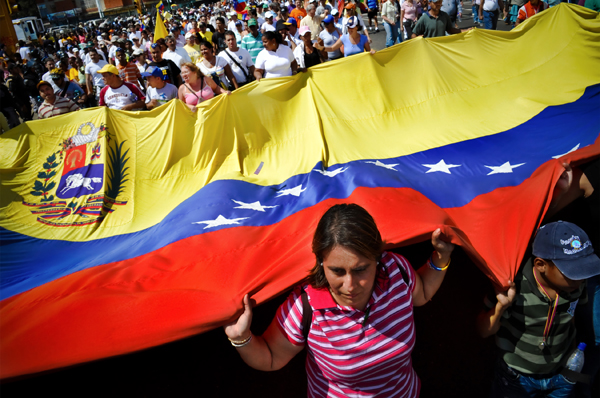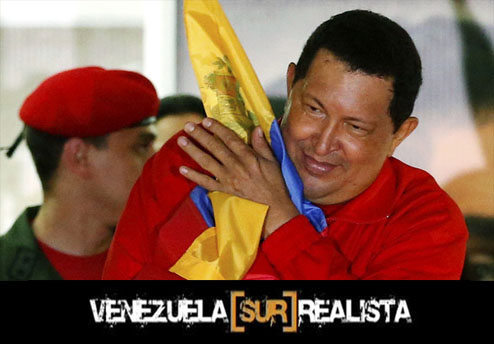[box type=”bio”] Note: This article is meant as a basic primer on the background of Venezuela’s violence currently in the news. My hope is that non-politically active readers in North America gain a better insight into the arguments that both groups are voicing. My sincere thanks to Dr. Pablo Policzer, Political Scientist at the University of Calgary for providing many of the documents I quoted for this article. [/box]
CORRECTION: A previous version of the article misquoted Jimmy Carter in saying the Venezuelan democratic system was the best in the world during the period from 1960-1990. He was in fact speaking of the period during Chavez’s presidency. It also said that the high levels of violence began before they actually did. High levels of violence began during this decade. My sincere apologies.
UPDATE (FEBRUARY 26, 2014): I’ve added a two arguments as to why the protest are happening. Also I have included new links for further reading.
For the last few days I have received a number of notices from my Venezuelan friends asking me to join them in protesting the human rights abuses happening in Venezuela. For the last couple of days I have followed the stories online but have noticed that this issue is far more complex that what is being portrayed in the social media streams and in major news outlets. This article hopes to bridge the gap of understanding for those who are just recently becoming aware or are interested in understanding what is happening in Venezuela. I dedicate this article to all my Venezuelan friends.
Venezuela 101
In order to understand what’s happening in Venezuela we need to start with a brief crash course in Venezuelan history.
Venezuela was part of the Spanish colonial empire until the 19th Century when Simon Bolivar led an independence movement that culminated in the creation of Gran Colombia comprising present-day Venezuela, Ecuador, and Colombia. According to the CIA World Fact Book Venezuela “emerged from the collapse of Gran Colombia in 1830 and for most of the first half of the 20th century, was ruled by generally benevolent military strongmen, who promoted the oil industry and allowed for some social reforms.” This produced a stratified populace where social inequality was the norm.
Democratically elected governments began to be established in 1959. From 1960-1990 Venezuela was led by conservative governments who continued to exploit oil and who were subsequently sensitive to the volatile consequences of oil markets. They also maintained close links with military, paramilitaries or armed forces to legitimize their rule.
[one_half][box type=”shadow”]
Key Political Terms
Left-right Political Spectrum : system of classifying political positions, ideologies and parties
Left wing : The Left seeks social justice through redistributive social and economic policies, and includes progressives, communists, social-liberals, greens, socialists, secularists, feminists, anti-imperialists, anti-capitalists, and anarchists among others.
Right wing : The Right defends private property and capitalism and includes conservatives, reactionaries, neoconservatives, traditionalists, capitalists, neoliberals, social-authoritarians, monarchists, theocrats, nationalists, Nazis (including neo-Nazis) and fascists.
Coup d’état (or coup) : a sudden, violent, and illegal seizure of power from a government.
The Executive : The person or branch of a government responsible for putting policies or laws into effect.
Paramilitary : (of an unofficial force) organized similarly to a military force.
Neoliberal : relating to a modified form of liberalism tending to favor free-market capitalism.
Polarization : divide or cause to divide into two sharply contrasting groups or sets of opinions or beliefs.
[/box][/one_half]
Gun ownership has increased over the last decade. For every 100 people there are approximately 11 who are armed. Venezuela ranks 27th in the world for number of citizens with privately owned guns. It is estimated that the total number of guns (both licit and illicit) held by civilians in Venezuela is between 1.6-4.6 million.
Over the last decade the country has seen an increase in the level of crime. The increase of crime along with high levels of poverty have meant that venezuelans live in a constant state of fear.
Venezuela is a highly urbanized country with 93% of the population living in the City—most in cities like the capital of Caracas. Like many Southern American countries the poor live side by side with the rich though not necessarily in the same neighborhood as the middle and upper classes often live in gated communities protected by independent security forces.
Venezuela is a young country with 46% of the population being between one and 19 years-old and 32% of the population being between 20-39 years-old.
The Rise of Hugo Chavez
In the 1990s Venezuela saw a shift from right-wing political leaders to left-wing popular support for a lieutenant colonel named Hugo Chavez.
Chavez first gained notoriety in 1992 when he attempted to oust democratically elected president Carlos Andrés Pérez. The attempted coup failed and Chavez and his followers were sent to jail. That same year President Rafael Caldera pardoned Chavez and his revolutionary members.
In 1998 he incorporated himself into the political systems and in 1999 garnished massive popular support to win the general elections. Chavez’s presidency lasted from 1999 to 2013. Speaking about the democratic process during Chavez’s presidency Jimmy Carter, former U.S. president, Nobel Prize winner, and monitor of ninety two elections worldwide in his capacity as director of the Carter Center, said the Venezuelan electoral system is “best in the world.”
During his time as president Chavez sought to implement a leftist socialist agenda which planned to alleviate the social ills prevalent in Venezuela while at the same time attacking capitalist globalization and existing democratic institutions. Through his socialist “missions” he redistributed oil revenues into health, education and housing programs and continually centralized power on the executive. He promoted the economic co-operation of Latin American states on principles other than free-trade and market exchange to curtail the influence of the US. He furthered entrenched his leftist-ideologies by strengthening ties to Cuba and Iran. Taking inspiration from Simon Bolivar’s attempt to unify the Southern American states Chavez named his campaign “The Bolivarian Revolution,” and attempted to bring his “21st Century Socialism” to a world stage.
The Chavez Love-Hate Relationship
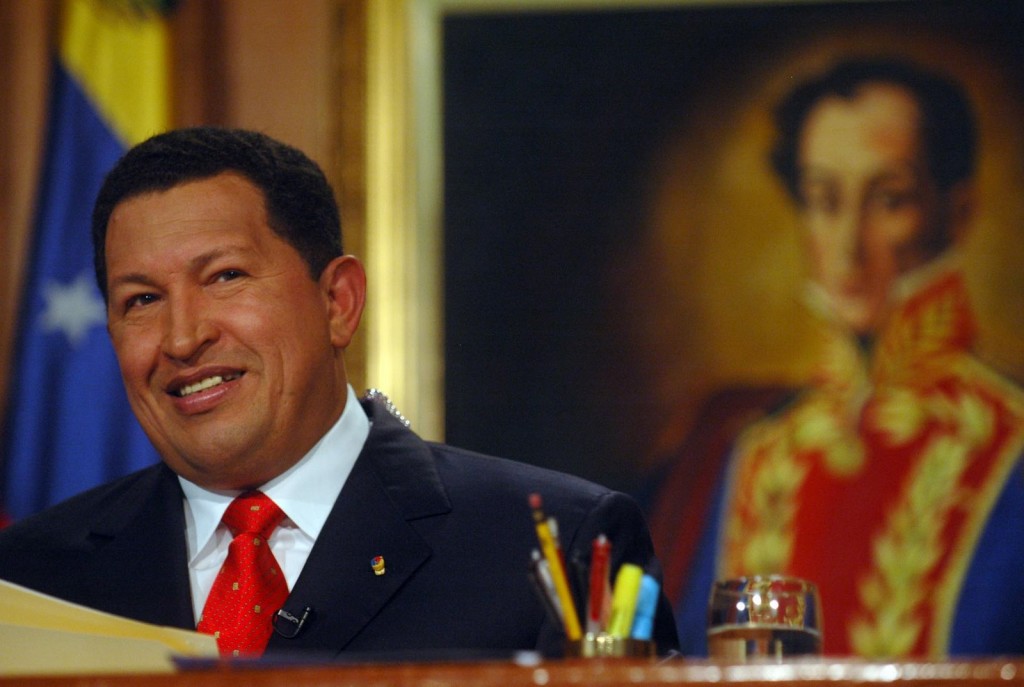
In Venezuela you either love him or hate him. There is very little middle ground in the social conscience of Venezuelans regarding Chavez. For many of the poor and often marginalized he is revered as the great “Commander.” His charismatic personal approach to governing endeared him to many of the Venezuelan electoral who had been excluded and forgotten by the governing elite. For others he was a cancer that needed to be exterminated.
His loud rhetoric against established capitalist and conservative institutions both within Venezuela and abroad disenchanted him with many in the middle and upper classes. In 2002 a coup against Chavez led by media moguls, conservative factions and sponsored by the US failed to remove him from power. He was arrested and held for 47 hours and eventually released and re-instituted into power—in part because of the massive anti-coup demonstrations by Chavez’s followers. His opponents were dealt with swift penalties and were either imprisoned or exiled.
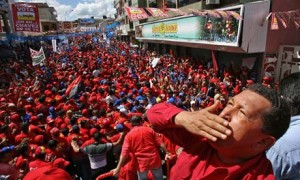
Political scientists Susan Spronk and Jeffrey R. Webber observed that after the failed coup the next step of the anti-Chávez factions of Venezuela’s elite was economic sabotage. “In December 2002 and February 2003, the management of Venezuelan Petroleum, (Petróleos de Venezuela, PDVSA) shut down production, locking out workers. Chávez’s response was to fire the disloyal managers, dismissing 300 of them by January. By April, production was back to pre-lockout levels with the help of new managers and, more importantly, workers loyal to the government who decided to take matters into their own hands.” According to the CIA World Fact Book after the oil-strikes of 2002-2003 an estimated 20,000 Venezuelans were fired from the government owned company. Thousands of these highly technically trained Venezuelans emigrated to Canada, Colombia, and the United States.
During his era Chavez tightened his control on media, the public monies, and other state owned companies. But it was his use and control of Venezuelan oil revenues that garnished him infamy.
Spronk and Webber note that Venezuela’s history could have been that of other oil-rich states. “Other petro-states, such as those in the Gulf, have funnelled the rent into a grotesque pageantry of the rich—skyscrapers, theme parks, and artificial archipelagos—built on the backs of indentured South Asian migrant laborers. They’ve done so, moreover, while aligning geopolitically with the U.S. empire—backing the wars, and containing the Arab uprisings. In Venezuela, as a result of the shifting balance in social forces and the radicalization of the Bolivarian process since 2003, the state has been forced to adopt a different set of priorities.”
Through economic initiatives Chavez was able to amass large support from neighbouring Latin American countries and effectively oppose American neoliberal initiatives in the region.
Maduro Comes to Power
On March 5, 2013 Chavez died after battling cancer for two years. In April, Vice President Nicolás Maduro faced off against opposition leader Henrique Capriles in presidential elections. In a surprisingly tight result, Maduro beat Capriles by only 1.5 percentage points. For Chavistas this was a marvelous victory. For Capriles supporters this was evidence of high levels of fraud. This close election result lead to large demonstrations against Mauro and left nine dead in the few days following the election.
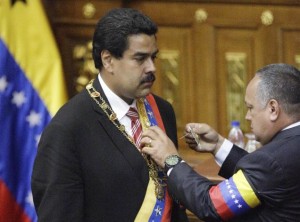
In the wake of the elections Venezuela was in bad shape. When Maduro took office he faced high levels of unemployment, inflation and lack of basic goods. Although he admitted that the government needed to change its course in order to correct some of the failed policies of his predecessor he failed to take any action. Because of the polarized state of the country he began to try and consolidate his support and power. He continued to use anti-capitalist rhetoric and blamed US backed plans to remove him from power. Some observers have noted that there is merit to Maduro’s claims. He blamed the opposition for opposing his economic goals and denied that his predecessors economic policies failed. He has not been able to address inflation and the lack of basic goods like paper and flour. He has sought to curtail his policies’ negative effects by allowing the Central Bank to keep printing money while the country’s currency continued to devalue.
In November 2013 Maduro asked and got Congressional approval to put into place a law that would wage an “Economic war” against the “parasitic bourgeoisie.” This law allowed him to lower the price of household appliances in stores and chains, and imposed by decree 30% maximum profits for companies, with the eventual imposition of heavy fines and imprisonment for offenders. This not only did not help with inflation it also did not solve the problem of the lack of basic goods. The lack of basic goods has had such a debilitating affect to production of major goods that some companies like Toyota have had to shut production for the meantime.
Political scientist Andrés Serbin points to five problems affecting Venezuela today:
- Highly polarized electorate
- Increased power of the Military
- Mismanagement of and over reliance on Oil
- Economic recession leading to high inflation and lack of basic goods
- High levels of violence
Venezuela Today
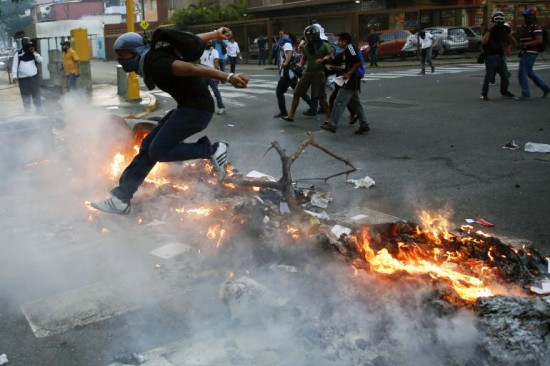
In February 2014 Venezuelan youth took the streets to protest the economic and social conditions of the country. As the demonstration grew in number so did the violence. On February 12, three people were killed. Leaders of the opposition blamed the government forces and used social media to illustrate how repressive the government has become. The Maduro government blamed opposition leaders and called for the arrest of Leopoldo Lopez. Lopez had become the opposition’s face against the government by this time. According to CNN Lopez was detained this week on terrorism and murder charges, but on Thursday his lawyers say prosecutors dropped those charges, replacing them with arson and conspiracy counts.
[box type=”info”]UPDATE (FEBRUARY 24, 2014): On Sunday February 18, the Mercosur governments (Brazil, Argentina, Uruguay, and Venezuela) released a statement stating that they support the Venezuelan government and stand against the opposition. They argue that a democratically elected government should not be illegally removed.[/box]
So far there has been no consensus on why people have taken to the streets. According to The New York Times there are three main arguments as to why this is happening though nobody can agree.
“Some observers see the demonstrations as a verdict on food and medicine shortages, inflation and economic stagnation. Others see them as the tantrum of a retrograde former elite [Capriles] bent on nullifying the results of the last election. The government, for its part, is sticking to the old script: Venezuela is falling victim to a fascist conspiracy cooked up by American officials who are terrified of its revolutionary aspirations.”
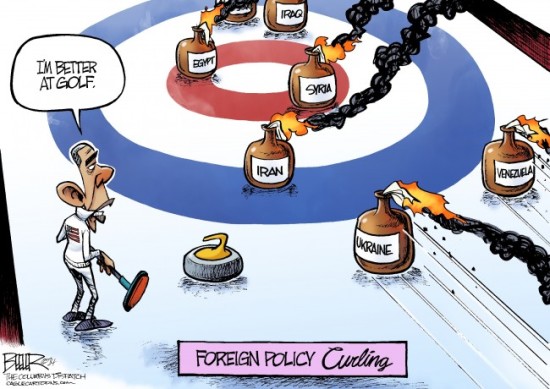
It’s understandable why observers still disagree with the reason for the violent protest. On the one hand not only are members of the opposition Chavista sympathizers but there also are anti-Chavistas in the mix. Those same factions responsible for the 2002 coup against Chavez are also involved and have a vested interest that Maduro is removed from power because it serves their purpose. It doesn’t help that the government has put a muzzle on the media and that violence has been used to suppress the demonstrators. The violence has been heavily documented on social media accounts but some photos shared by opposition sympathizers have also proven to be false. However not all of the violence can be attributed to the government.
Venezuelan political scientist Margarita López Maya notes “The discomfort of significant portions of society, that is deep and will not go away by acts of sleight of government media, are not to be confused with the violence generated by paramilitary groups, vigilante or “armed groups”, which have been present in almost all protests of the last week causing unrest. These vigilantes do not obey anyone, neither the government nor the opposition. They have their own agenda.”
López Maya notes that the actions taken by Maduro to cover his inefficiencies are akin to tyranny and that this must change if Venezuela is to see a glimpse of change.
So, needless to say that Venezuela is between a rock and hard place. As the events continue to unfold we will yet see what Venezuelans around the world wake up to.
I hope this article has shed some light on the background of the events. Leave a comment below!
Venezuela [Sur] Realista: The Republic of Hugo Chavez—Spanish with English Subtitles
A production by Francisco Guita and Alejandra Morales Hacktt (2011)
In the eyes of his supporters, he has championed the rights of the poor and bravely defended his country’s interests in the face of foreign aggression. Opponents have portrayed him as an embarrassing and dangerous megalomaniac, squandering the nation’s oil wealth while bolstering his own power base. This in-depth look at Venezuelan president Hugo Chávez explores his Bolivarian political philosophy, his adoption of “21st-century socialist” principles, and the challenges he has faced as a highly polarizing leader. Produced in anticipation of Chávez’s bid for a fourth term in office, the film presents interviews with community leaders, political figures, intellectuals, and journalists, all of whom shed light on the complexities of life in Chávez’s Venezuela—and the volatile atmosphere in which he pursues his aims. (Spanish with English subtitles, 53 minutes)
For more info check out the sources below:
[learn_more caption=”Learn More” state=”open”]
Check out the following links to learn more
http://www.cnn.com/2014/02/20/world/americas/venezuela-qa/
http://online.wsj.com/news/articles/SB10001424052702304675504579391300646725312 (Similar to CNN just from a different source)
https://carlosleon.lamula.pe/
http://caracaschronicles.com/
[/learn_more]

